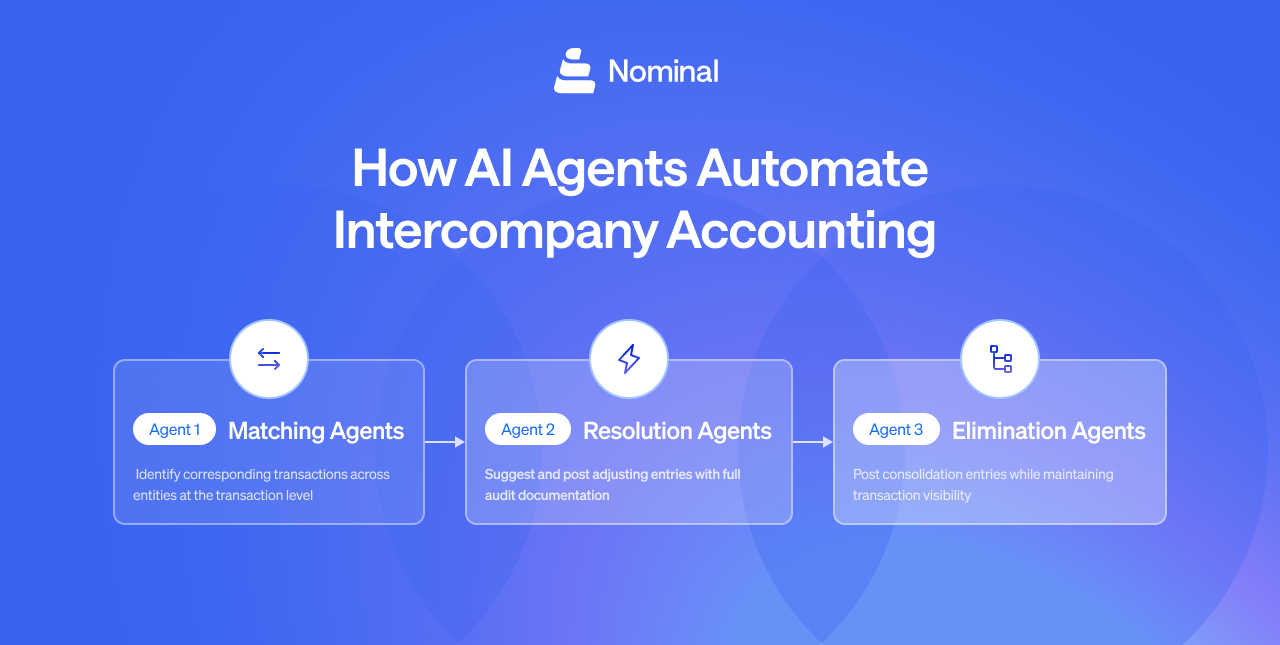
Intercompany accounting tracks transactions between entities under the same parent company. Manual processes create delays, errors, and audit risk at scale. AI agents now automate matching, resolution, and elimination entries across multi-ERP environments without disrupting existing workflows.
Every multi-entity organization faces the same challenge: accurately tracking and eliminating transactions between subsidiaries. When your US parent loans $500,000 to your UK subsidiary, or your manufacturing entity sells inventory to distribution, those transactions appear in each entity's books. But consolidated financial statements must eliminate them to avoid inflating revenue and expenses.
This is intercompany accounting, and it becomes exponentially more complex as organizations scale. What works with three entities breaks down with dozens of legal entities across different countries, currencies, and ERP systems. Finance teams spend days each close cycle manually matching transactions and correcting errors before consolidation.
Intelligent agents offer a different approach: automation that understands transaction context and handles matching, resolution, and elimination without requiring process changes.
What Is Intercompany Accounting?
Intercompany accounting is the process of recording, reconciling, and managing financial transactions between different legal entities under the same parent company. This includes sales of goods, shared services, intercompany loans, and management fees. It ensures accurate consolidated financial statements by preventing double-counting and providing a clear view of the organization's financial health.
Common transaction types include goods and inventory transfers between subsidiaries, service allocations for shared IT or HR resources, intercompany loans for financing arrangements, and management fees for oversight or intellectual property.
The challenge isn't just recording these transactions. It's ensuring both sides are properly documented, reconciled, and ultimately eliminated from consolidated statements. Under GAAP and IFRS, consolidated reports must eliminate intercompany transactions to show only external revenue and expenses.
Why Intercompany Accounting Becomes Complex at Scale
Complexity grows exponentially with organizational size. A company with five entities might have ten intercompany relationships. Twenty entities could have nearly two hundred potential relationships.
The real complexity isn't volume. It's that teams operating these entities work in different countries, time zones, and systems. Your Singapore team might record a transaction Monday while your Germany team processes the corresponding entry Thursday. This asynchronous recording creates temporary mismatches that must be identified and resolved before close.
Multi-currency operations add another layer. When your Japanese subsidiary invoices your Canadian entity in USD, exchange rate differences create discrepancies requiring investigation and adjustment. Multiply this across dozens of entities and hundreds of monthly transactions, and the reconciliation burden becomes overwhelming.
Spreadsheets break under this load. Version control fails, formulas get overwritten, and manual lookups introduce errors. The audit trail becomes nearly impossible when changes flow through shared Excel files rather than controlled systems.
The Human Cost of Manual Intercompany Reconciliation
Behind every delayed close is a team spending hours on repetitive work. They export data from multiple ERPs, paste it into Excel, and begin matching transactions between entities. When discrepancies appear, they send emails back and forth between entity controllers, trying to determine which side recorded incorrectly.
This back and forth eats up days during close. A controller in one entity waits on responses from three others before finalizing numbers. The consolidation team can't begin until all intercompany accounts are reconciled and balanced.
The process is particularly painful for organizations grown through acquisition. Each acquired company might use different ERPs, charts of accounts, and recording processes. Finance teams spend significant time normalizing data before reconciliation begins.
This burden has real costs beyond time. Finance professionals burn out from repetitive work that doesn't leverage their expertise. Errors slip through despite careful review. Audit preparation becomes a scramble to reconstruct adjustment logic made weeks earlier.
How Nominal's AI Agents Automate Intercompany Accounting
Intelligent agents automate the investigation and resolution work that finance teams currently handle manually. Rather than simply accelerating processes, agents handle the actual work.
Nominal uses three specialized agents working together:

Matching Agents
Matching agents analyze transactions across entities to identify corresponding intercompany entries. They work at the transaction level, comparing amounts, dates, descriptions, and reference numbers to find matches even when timing differences exist.
Resolution Agents
Resolution agents automatically suggest and post adjusting journal entries when discrepancies are identified. If one entity recorded $10,000 and another recorded $10,200, the resolution agent determines which side needs adjustment and creates the correcting entry with full audit documentation.
Elimination Agents
Elimination agents handle the final step by automatically posting consolidation elimination entries after intercompany accounts are reconciled. These entries remove intercompany balances from consolidated statements while maintaining complete transaction visibility.
This multi-agent approach solves a critical challenge: you can't let AI roam freely through financial systems. The agents work within a task management framework, providing human oversight at key decision points while automating repetitive investigation and posting work.
Matching, Resolution, and Elimination Done Without Spreadsheets
The end-to-end workflow removes spreadsheets from reconciliation entirely. Nominal integrates with each entity's ERP and pulls transaction-level data into a unified ledger, giving matching agents complete visibility across the organization.
The matching agent runs continuously, identifying corresponding transactions across entities. It handles the reality that teams in different locations can't record simultaneously. Your US team might record a service fee on the 15th while your UK team processes the corresponding expense on the 18th. The matching agent finds these pairs despite timing differences.
When discrepancies appear, the resolution agent investigates at the transaction level. It identifies whether the issue is a recording error, exchange rate difference, or a legitimate timing issue that will resolve next period. For straightforward corrections, it suggests adjusting entries with complete logic documentation.
Once intercompany accounts are balanced, the elimination agent posts consolidation entries automatically. These entries remove intercompany receivables, payables, revenue, and expenses from the consolidated view.
Every agent action is logged with timestamp, user, and logic history, creating a complete audit trail that satisfies SOC 1 and SOC 2 compliance without manual documentation.
Multi-ERP Environments and Cross-Border Operations
Large organizations rarely run on a single ERP. Your parent company might use NetSuite, European subsidiaries run SAP, and recently acquired entities still operate on QuickBooks or Sage.
Traditional reconciliation tools require all entities to use the same system or manually export data. Nominal integrates directly with each ERP and normalizes data in its own general ledger. This ERP-agnostic architecture means you don't need to force entities onto a single platform for automated reconciliation.
Cross-border operations introduce the added complexity of multiple currencies. When entities record transactions in different denominations, exchange rate fluctuations create natural variances requiring appropriate handling. Nominal's agents understand these international scenarios and distinguish between discrepancies requiring correction versus differences from foreign exchange translation.
The system recognizes you can't always force process changes. If teams have recorded intercompany transactions a certain way for years, requiring new procedures creates resistance and delays. The agents work within existing processes rather than forcing changes, making adoption faster and less disruptive.
Recommended read: Intercompany Transactions Explained, Streamlined, and Automated
Scale Your Accounting Operations With Intelligent Automation
Intercompany accounting doesn't have to be a bottleneck. The traditional approach of adding more people or spreadsheets has clear limits. Organizations relying on manual reconciliation will always face delays, errors, and frustrated teams during close.
Intelligent agents automate the investigation, matching, and resolution work that currently consumes days of valuable time. They work within existing processes and systems rather than requiring wholesale changes. And they provide the oversight and audit trail that financial operations require without sacrificing automation.
Finance leaders at multi-entity organizations now have a choice: continue scaling headcount to match growth, or deploy intelligent agents that handle repetitive reconciliation work automatically.
See how Nominal's AI agents can transform your intercompany accounting process. Book a demo to learn how we help finance teams close faster without adding headcount.





